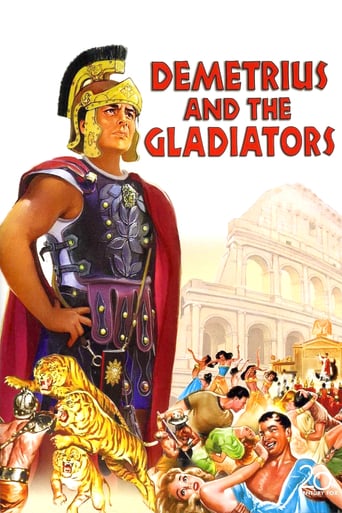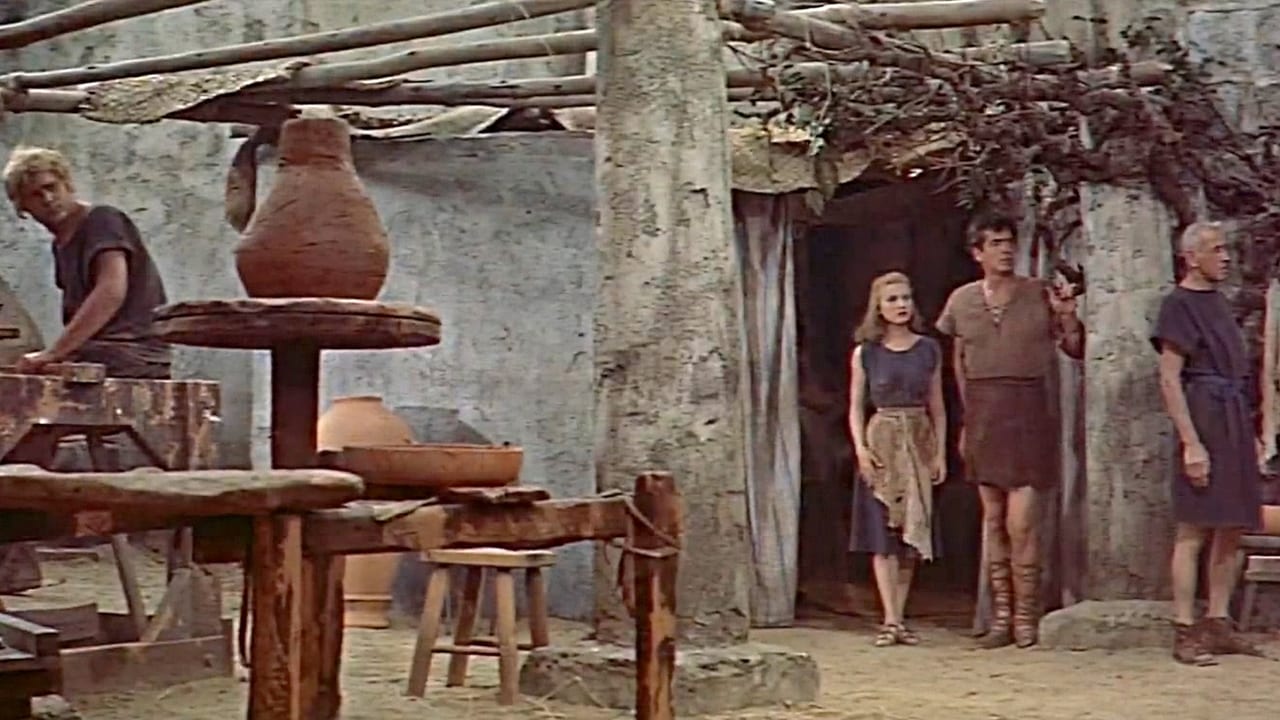HotToastyRag
The Robe starred Richard Burton, Jean Simmons, and Victor Mature. It was a biblical epic about a Roman soldier who felt guilty condemning Jesus to death. The film was such a success, Hollywood spawned a sequel, without the two leads, but starring Victor Mature in a reprise of his role as Demetrius, a Christian slave.Susan Hayward joins him in the film, as does Michael Rennie, Deborah Paget, Ernest Borgnine, Richard Egan, and Anne Bancroft. Without Richard Burton's acting, the movie turns into a corny, over-the-top Ben-Hur wannabe. I've only seen Victor Mature in two good performances: one was After the Fox, in which he basically spoofed himself, and the other was Kiss of Death, which was more famous for Richard Widmark's breakthrough performance than Mature's dramatics. In Demetrius and the Gladiators, he gives a typical "Victor Immature" performance, and it turns into a B-picture. But if you're nuts about gladiator or biblical movies, it's not the worst one in the world. Trust me, I've seen that one.
jc-osms
I love a good sword and sandal epic and this sequel to "The Robe" pretty much fits the bill. The hard-to-dislike Victor Mature this time steps up to the title part of the recent Christian convert Demetrius who for resisting the marauding Romans search for the holy relic in his care, finds himself dragooned into gladiator school only to later renounce his faith when his visiting young female admirer is apparently killed at the hands of some of his mob- handed fellow-fighters. Not to worry, chief disciple Peter seeks him out just in time and pricks his conscience enough to turn him back from a whole host of commandments he's recently broken, mostly at the urging of Messalina, the wanton wife of Emperor-in-waiting old, safe and sound Claudius.The sets, probably carried over from its predecessor, are grandiose indeed and the action sequences are fine for their time. I looked closely at the scene where Demetrius makes his name as a gladiator by killing three tigers in the arena and they looked real enough to me. The fight sequences are okay too. Of course films like this, with everyone pretty much wearing dresses, tend to see the actors either ham or camp it up and there's little doubt that Jay Campbell as the notoriously deranged Emperor Caligula is doing both while Mature however plays it pretty straight for the most part. Susan Hayward vamps it up as the loose Messalina while Michael Rennie is positively saintly as Peter.Some of the dialogue betrays its twentieth century origins such as when Demetrius warns that his old camp is likely to be "wiped out" by the Romans while Lucia's miraculous recovery takes some swallowing too. Nevertheless, this film which I always remembered fondly from my youth, managed to satisfactorily entertain me again and even if it's very much hanging onto the hem of its more illustrious predecessor, makes for a good enough entry in the list of watchable Hollywood epics in the 50's.
thomreid
A worthy, though rushed, follow-up to "The Robe" has a fun cast, a tired looking Victor Mature (from all his work on the previous film, no doubt). Susan is a bit 50s looking for ancient Rome, with her bushy hairdos. Jay Robinson again goes way over the top as Caligula but really has some delicious mad scenes. One oddity: while watching the trailer on the DVD, scene 17 with Debra Paget on the trailer has her saying a line about "seeing Jesus". This line was NOT in the finished film. Wonder why. All in all, fun to watch, a good cast, and a fine score by Franz Waxman, who wisely gives credit to Newman for the themes used.
James Hitchcock
The historical epics which were so popular in the fifties and early sixties frequently had a religious theme. Some were based on stories taken directly from the Bible ("The Ten Commandments", "Solomon and Sheba", "King of Kings"), while others tried to convey a Christian message indirectly. Thus the central character of "Spartacus" is treated as a metaphorical Christ-figure, and "The Egyptian" draws parallels between Christianity and the monotheistic religion of Atenism which briefly flourished under the heretical Pharaoh Akhnaten. "Demetrius and the Gladiators" is one of a number of films (the most famous is "Ben Hur", but others include "The Robe", to which "Demetrius" is a sequel, "Quo Vadis" and "The Fall of the Roman Empire") which deal with the early days of the Christian church and its persecution by the Roman emperors. The stories told by such films were normally fictitious, but were set against a background of historical fact. The central character, Demetrius, is a former slave who, after assaulting a soldier who is molesting his girlfriend Lucia, is sentenced to fight in the arena as a gladiator. This causes him difficulties as he is a Christian whose moral code will not permit him to kill another man, even in self-defence. He survives, however, largely because he attracts the attention of Messalina, the wife of Claudius, uncle of the Emperor Caligula. Later, believing that Lucia has accidentally been killed by another gladiator, Demetrius renounces his Christian faith, and fights fiercely, killing the man he believes to have been responsible for her death and several others. His courage and skill with a sword lead to his being made a tribune in the Praetorian Guard, and he becomes Messalina's lover. As in "The Robe", the robe which Christ wore to His crucifixion plays an important part in the film; Caligula wants to get his hands on it because he believes that it has magical powers and that it will give him the secret of eternal life. Several of the epics of this period combined, incongruously, an improving religious message with a good deal of eroticism, with much bare female flesh on display- examples include "Solomon and Sheba", "Esther and the King" and "Salome", where we get to see the famous dance of the seven veils, but it is made clear that, contrary to the Biblical version of the story, Rita Hayworth's character is in fact a virtuous heroine who only is flashing her legs in public in a desperate attempt to save John the Baptist from his fate. There are elements of this strange combination of godliness and sexiness in "Demetrius", but the sexiness is very much downplayed. Messalina's notorious promiscuity is alluded to rather than shown on screen, and the scene between the gladiators and the women brought in to entertain them may be an orgy, but it is a very decorous one. The film-makers were clearly more interested in the element of godliness, and, unlike some films of this type, "Demetrius" raises genuine moral issues about pacifism, non-violence and Christian forgiveness. Demetrius himself is a man who goes through a crisis of faith and abandons his Christian beliefs in favour of an ethic based on revenge and worldly ambition. His conscience, however, is troubled, especially after he is reproached by his old friend St Peter. He is a more complex and interesting figure than many epic heroes, so it is unfortunate that the part was played by Victor Mature, an actor whose success often seemed to owe more to his ruggedly masculine good looks and his virile physique than to his acting technique. Susan Hayward (an actress who could often look bored and listless when asked to play roles that did not interest her) makes a weak Messalina. Neither give their worst performance (in Hayward's case that must surely have been "The Conqueror"), and Mature brings a certain rough sincerity to his part, but I felt that the film might have been improved with other actors in these roles.Nevertheless, there was much I enjoyed about the film. Michael Rennie was appropriately dignified as Peter, played as a sort of ascetic philosopher, although I would agree with the reviewer who pointed out that it would be hard to imagine him ever working as a fisherman. I also liked William Marshall as Glycon, the former African king now forced to fight as a gladiator, who befriends Demetrius. ("Spartacus", a better film than "Demetrius" although it owes something to it, also features a sympathetic black gladiator who befriends the hero). Jay Robinson, who played Caligula, has been criticised by some reviewers for overacting, although I must say I liked his performance. Historians have doubted whether the real Caligula was actually insane, although he was undoubtedly cruel and eccentric, but in the context of this film he is definitely presented as a lunatic, a man who has literally been driven mad by power to the point where he believes himself to be a god. (Not even Hitler went that far). There is an interesting contrast with a modern epic, "Gladiator", in which Joaquin Phoenix plays another tyrannical Roman Emperor, Commodus, as a basically weak and insecure young man. Although Phoenix's performance works well in the context of that particular film, the way the role of Caligula was written called for something quite different- the sort of ranting, over-the-top performance which might be unfashionable now but would have been less controversial in the fifties.Although the standard of the acting is mixed, I generally enjoyed the film. It does not reach the standard of the really great epics, such as "Spartacus" or "Ben-Hur", but it works well on the level of spectacle, with fine sets and costumes and some exciting scenes of gladiatorial combat, and has a more intelligent script than many epics. 7/10



 AD
AD



